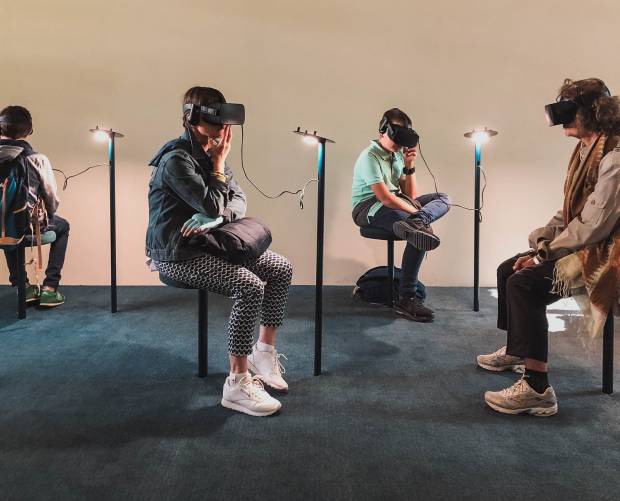 As a Strategy Consultant for Logica CMG in the Netherlands, he was instrumental in the creation of text voting. And as a Creative Group Head of ad agency JWT, he knows the big agency world. For the past four years, he has been evangelising the mobile channel, latterly in his role as an Associate Consultant in the TME (Telecoms Media and Entertainment) division of Cap Gemini. So Jim Brooks is perhaps uniquely placed to see how mobile is becoming integrated with other marketing media and channels. Brooks is unashamedly passionate about mobile as a marketing channel, so we caught up with him to find out where the industry is at and where its headed.
As a Strategy Consultant for Logica CMG in the Netherlands, he was instrumental in the creation of text voting. And as a Creative Group Head of ad agency JWT, he knows the big agency world. For the past four years, he has been evangelising the mobile channel, latterly in his role as an Associate Consultant in the TME (Telecoms Media and Entertainment) division of Cap Gemini. So Jim Brooks is perhaps uniquely placed to see how mobile is becoming integrated with other marketing media and channels. Brooks is unashamedly passionate about mobile as a marketing channel, so we caught up with him to find out where the industry is at and where its headed.
MM: Firstly, can you define what you understand by mobile marketing?
JB: For me, things like text voting, text n win and raw content like ringtones are out of scope. Whats in scope is brand advocacy, loyalty CRM, subscription, the areas where brands have traditionally used other channels.
MM: So when you talk about evangelising mobile as a marketing channel, what do you mean by that?
JB: On one hand, its looking at the way brands can increase their visibility and knowledge of the channel. Then its about educating the channel to speak the language and vocabulary of other media channels. Finally, its about helping a brand, like Peugeot for example, to create a mobile marketing example that they can talk about.
MM: Taking the first point first then, how do you go about increasing a brands visibility and knowledge of mobile as a channel?
JB: I come from an ad agency background, on the creative side. Now when
a brand gives an ad agency a brief, the ad agency has a set of clear
ideas as to what will do with that brief. So if its a 50,000 sports
car, the agency already knows how to handle that account creatively,
and which channels are best suited to effectively and efficiently reach
the target audience. All media channels will add value and try to
differentiate themselves through efficient measurement of the medium.
So what Im trying to do is to bring mobile up to the level of
visibility and momentum that the ad agencies and media agencies expect
to see.
MM: And how easy have you found that job?
JB: Its been bloody difficulty, to be honest. Trying to evangelise
among people in ad agencies is always difficult, because they are always
sceptical of new channels because they do not know how to create and
conceive into that channel.
The (network) operators have only ever been focused on their subscriber
base and they see third parties as just a threat. So the value chain of
ad agencies, internet, TV, satellite, aggregators, they are all there
to be seen in a high level view of the visibility of brands, with
mobile as latest addition, but without explaining how a media channel
works, and, having selected it, how you get measurements out of it, is
very difficult, because none of that has been available before, because
the operators have been like a large billing engines. They have
millions of subscribers, some they bill, some do top-up, but thats
about as far as they go.
With mobile marketing, I have tried to use my experiences in ad
agencies and my knowledge of the mobile channel to bring the
performance of that channel up to the requirements of the other
channels.
MM: So is it getting any easier?
JB: It is, because when this new channel appeared, firstly, from a
technical perspective, the operators throttled it, then the ad agencies
throttled it. Its just fortunate that VC (Venture Capital) funding
found a place in companies like Flytxt and 12snap and Sponge to enable
them to demonstrate to brands what mobile could do.
Brands are always adventurous, they will always try things out. They
take money from other places and say: What is this new channel, can it
work for me? So they self-discover, and eventually, it reaches a
tipping point, so we should thank the innovative adventurous brands who
have grasped the nettle and the companies that used the VC funding to
act as the mediator to provide the creativity and help to figure out
what works on a mobile phone, because they are the ones that have
stimulated it.
MM: So which brands are pushing the envelope in the mobile channel?
JB: McDonalds, Coke, FCUK, Peugeot, Argos, Gossard, there are lots of them out there. Most of the major brands have used mobile in a true marketing context
rather than things like textn win. They might have used text n win
as well, but theyve used it to launch new products, as Coke has done,
or in tie ups with film distribution like McDonalds.
MM: And do you think this impetus that there seems to be is here to
stay this time round, after the false dawn a couple of years ago.
JB: Yes, it will be sustained this time round. It happens inevitably in
any new channel, it happened with the Internet. All new channels go
through this pain. The channel gets discovered, gets excitable, the
opinion formers wait until their level of knowledge reaches a point
where they feel comfortable trashing it, then they come back and say
its the most amazing thing theyve ever seen. But the initial reaction
is to say they dont understand it so its rubbish. Ask yourself: would
an agency recommend a campaign today without a web element to it? I
think not. A lot of people get mobile now, so I think 2006 is going
to be a major tipping point for it as a marketing channel. Ive seen
surveys showing that brands that get it and that are being provided
with solutions are putting as much as 7% of their gross revenues into
mobile, rising to 10-20% in the next 3 years, and that 80% of all
brands will be using it in some way by 2008.
MM: So what does the industry need to do know to ensure it doesnt drop the ball?
JB: It needs to consolidate the value chain. The agencies are picking
up the pace now, so we are seeing the independent sectors of ad
agencies like Ogilvy One that were set up to deal with new media
channels, with guys like Rory Sutherland, and also JWT, McCanns, they
are all beginning to embrace it in their new media and digital channel
business.
We are seeing the aggregator taking over the role of enabler. Brand
wants to reach every consumer with a mobile phone, so they see the
networks as agnostic, so companies like mBlox and Mobile365 are
enabling total distribution across all networks.
The agencies are also beginning to understand how to create in the
channel. If Im in an ad agency, I know why I would shoot on film
rather than video, why I would use this director rather than that one,
which illustration I would use in a 1200dpi colour magazine, and which
one if it was running in The Sun in black and white. Im familiar with
my channel to conceive and deliver in it. Up until now, mobile has
still been spooky for them, the creatives have not known whether will
this picture look great or not when its viewed on a handset. But that
is starting to change.
MM: So where is the education coming from?
JB: Theres no-one really running lessons at Night School, its more an
organic sucking blood out of the discovery path thats happening, and
this is what causes the pace and growth of any new channel. Look at the
early days of the Internet. Spooky people got involved in web design,
and excluded the creative side. When the creatives had a go, they found
that what worked on one machine didnt work on another. But now, most
can create into a web portal
MM: So how long before mobile reaches the stage the Internet is at now?
JB: If Im optimistic, 2006-07. If Im pessimistic, 2008.
MM: Even if you take the worst-case scenario, that's still pretty encouraging.
JB: Oh yes, the growth is exponential. If you look at the Net, you
could say its been going for 10 years, but its more like four or five
years since people stopped rubbishing it. So if mobile marketing is in
is fourth or fifth year now, I would expect to see brands like Coke and
Peugeot saying they would not consider doing a campaign any more
without a mobile response element being a significant part of it. I
dont think, in fact, that Peugeot would launch a small family car
without a mobile response element because the launch of the 1007 was so
successful for them. So I'm very optimistic about the prospects.
Jim Brooks was interviewed by Mobile Marketing Magazine Editor, David Murphy
More interviews:
Wireless Information Network Founder, Peter Norman. Read
mBlox Executive Chairman, Andrew Bud. Read
.png)



